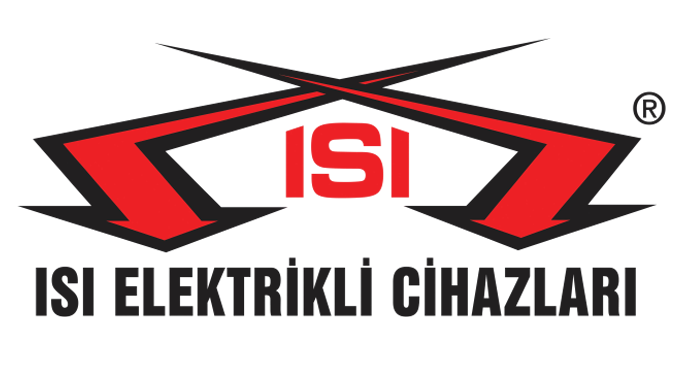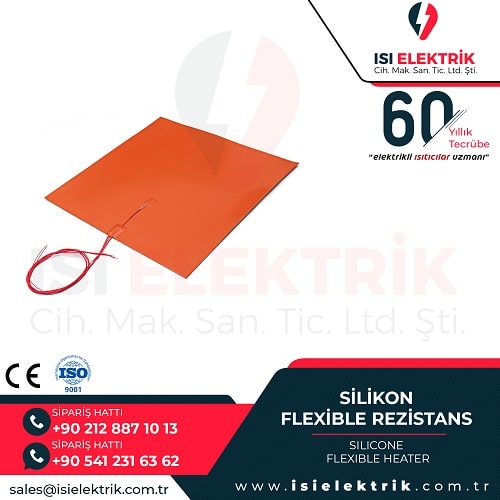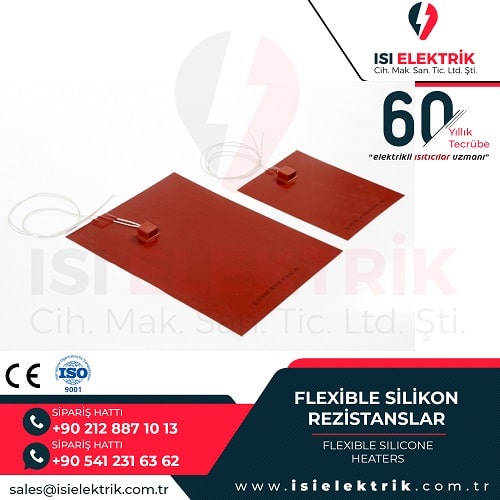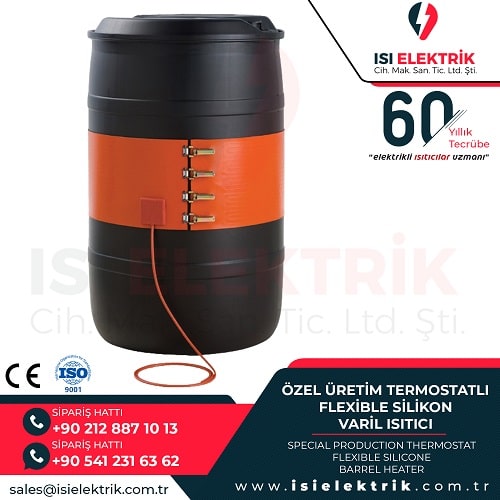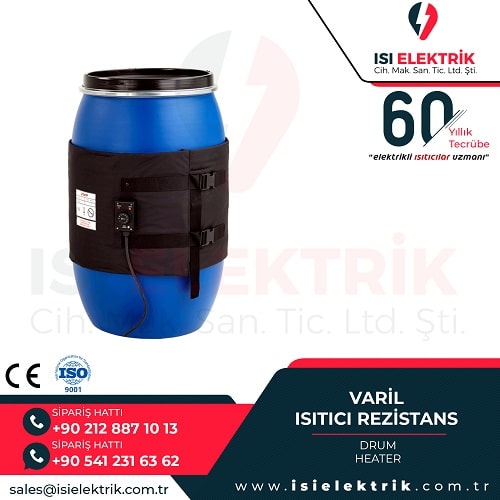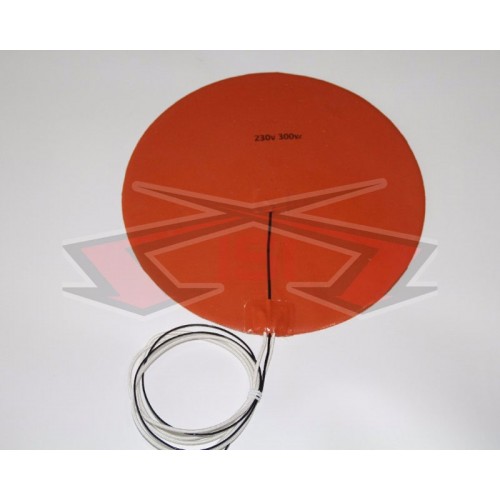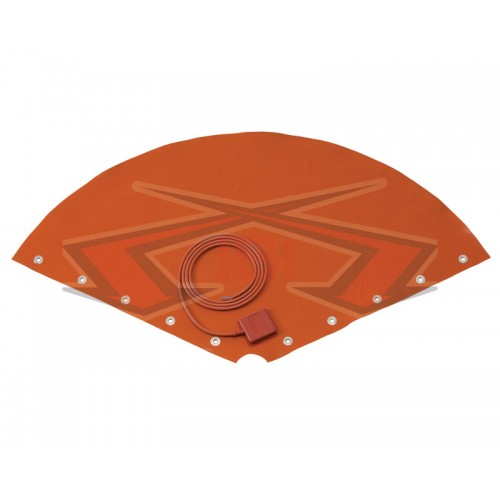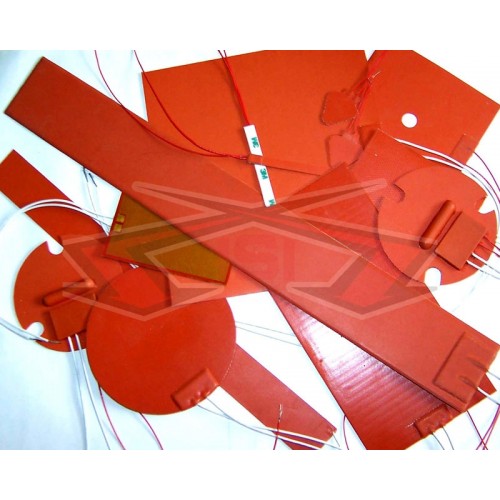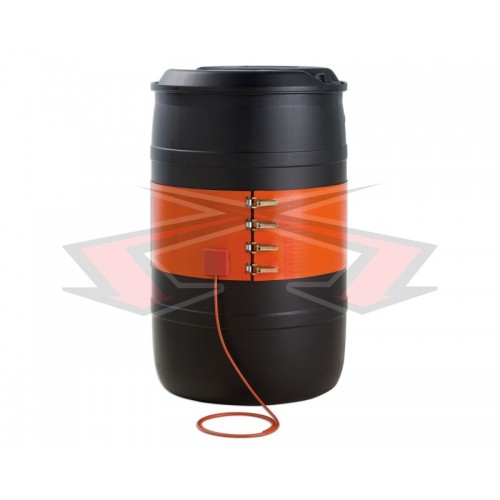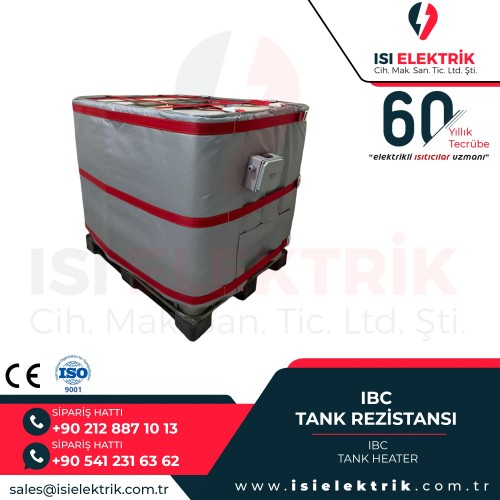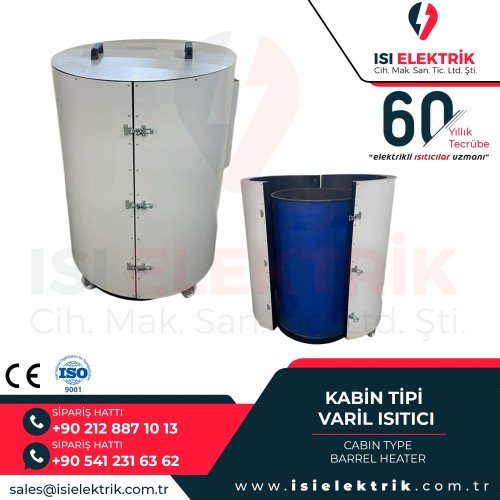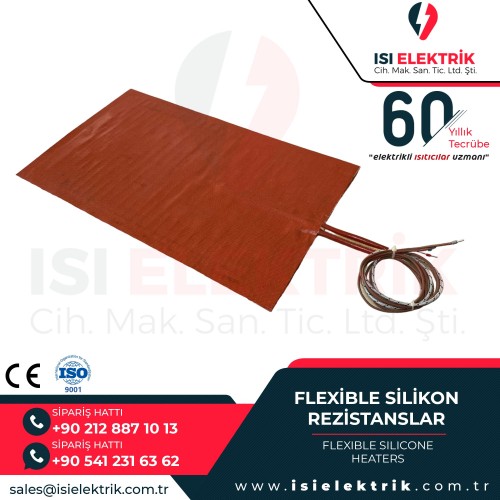Flexible Silicone Heaters
Flexible Silicone Heaters are specialized heating elements designed to maximize surface contact on different geometric surfaces, ensuring the most efficient heating performance. Thanks to their flexible structure, they conform perfectly to the surface, allowing homogeneous heat distribution. Compared to traditional heating elements, silicone heaters offer a more precise and efficient solution while consuming less energy and delivering high performance.
These heaters are manufactured from high-quality silicone materials, providing both flexibility and durability. The internal resistance wires ensure rapid heating, effectively utilizing energy. Additionally, their high-temperature resistance ensures long-lasting performance even under extreme conditions.
Flexible silicone heaters adapt seamlessly to complex and irregular surfaces. Their lightweight structure makes them easy to transport and install. With low energy consumption, they quickly reach the desired temperature, offering fast heating capabilities. Their durable design withstands high temperatures and mechanical impacts, while their even heat distribution ensures uniform surface heating.
This type of heater is widely used across various industries. In the cosmetics industry, for example, they are commonly wrapped around the outer surfaces of raw material barrels to prevent solidification and maintain a stable temperature. Additionally, they are used in medical devices, laboratory equipment, industrial machinery, and food processing applications. Wherever precise temperature control is required, these heaters provide an effective solution.
The installation of flexible silicone heaters is simple, and they can be produced in different sizes and power levels to fit various surfaces. Their ability to be customized according to user needs, combined with energy efficiency and long service life, makes them a preferred choice for industrial heating solutions. Designed to meet high safety standards, these heaters provide safe and efficient performance throughout their operation.
Flexible Silicone Heaters
Flexible Silicone Heater
A flexible silicone heater is a type of resistance heater made from heat-resistant silicone material and can be used over a wide temperature range. These heaters, thanks to their flexible structures, can easily adapt to different surfaces and evenly heat large areas.
Types of Flexible Silicone Heaters
- Single-direction flexible silicone heaters: These types of heaters typically generate heat in one direction. They have a flat or bendable structure and are usually placed on a base material. They are preferred when targeted heating of a specific surface is required. Widely used in industrial equipment, laboratory devices, and the food processing industry, their single-direction heat dispersion ensures energy efficiency while effectively focusing heat on a particular area.
- Dual-direction flexible silicone heaters: These heaters can emit heat both upwards and downwards, making them suitable for applications that require heat to be distributed in both directions. They help maintain thermal balance between surfaces, providing uniform heating. Dual-direction heaters are commonly used in medical devices, industrial drying systems, and applications such as pipe heating, storage tank warming, and large surface heating.
- Custom-designed flexible silicone heaters: These heaters are specifically manufactured to meet industrial requirements and can be customized with different power levels, shapes, and connection types. They are available in various thicknesses and cuts to perfectly fit the heating surface. Examples include models designed for heated vests, medical warmers, and electronic component protection.
- Self-regulating flexible silicone heaters: This type of heater features a special design that automatically reduces heat output when a certain temperature is reached. They are used to maximize energy efficiency and minimize the risk of overheating. These heaters are commonly found in applications such as freeze prevention for pipes in cold environments, protection of medical devices, and portable heating solutions.
- High-temperature-resistant flexible silicone heaters: Capable of withstanding temperatures up to 250°C, these heaters can operate safely under extreme thermal conditions. They are widely used in the chemical, automotive, and aerospace industries. With excellent heat stability and long lifespan, they provide reliable solutions for continuous heating processes.
Technical Specifications of Flexible Silicone Heaters
- Power Range: Can vary from 200 W to 4000 W.
- Voltage Levels: Voltage levels ranging from 24 V to 480 V can be used.
- Heat Tolerance: Can operate within temperature ranges from -40°C to 200°C.
- Body Material: Silicone-based.
- Heating Element Material: Nickel-chromium alloy or stainless steel is used.
- Dimensions: Can be customized according to the requirements of the heating area.
- Connection Options: Connections can be made with terminals, cables, or plugs.
- Heating Rate: Varies depending on the heating power and application characteristics.
- Cooling Time: Varies depending on ambient temperature and size of the heated area.
- Heat Distribution: Provides homogeneous heat distribution.
- Service Life: Can last up to 5 years depending on usage conditions.
- Protection Class: Different protection classes such as IP40 or IP65 are available.
- Mounting Options: Varies depending on the size and type of the heater, typically offering different mounting options.
Advantages of Flexible Silicone Heaters
- Fast Response Time: Flexible silicone heaters convert energy into heat quickly, reaching the desired temperature in a short time due to their low thermal mass. This feature is a significant advantage in applications requiring rapid response, from industrial machinery to medical devices.
- Low Power Consumption: Thanks to their high thermal efficiency, flexible silicone heaters generate maximum heat while consuming minimal energy. This ensures energy savings, reduces operating costs, and offers an environmentally friendly solution. They are especially economical for long-duration heating applications.
- Eco-Friendly Material: Silicone is a recyclable and non-toxic material. It does not release harmful gases or chemicals during use, making it ideal for food processing, healthcare, and laboratory equipment. Its long lifespan also reduces waste production, minimizing environmental impact.
- Silent and Vibration-Free Operation: Unlike traditional heating elements requiring mechanical movement or fans, flexible silicone heaters operate silently. This is a great advantage for applications needing a quiet environment, such as laboratories, office equipment, and medical devices.
- Flexible and Lightweight Design: Unlike rigid traditional heaters, flexible silicone heaters can be bent and shaped to fit complex surfaces, ensuring maximum heat transfer. They are widely used in drum heaters, pipeline heating, surface heating systems, and portable heating solutions.
- Wide Operating Temperature Range: Flexible silicone heaters can operate efficiently in temperatures ranging from -60°C to 250°C. This makes them suitable for both low-temperature and high-temperature applications.
- Water and Chemical Resistance: Due to their silicone coating, these heaters are highly resistant to moisture, water, oil, and various chemicals. This makes them reliable for use in food processing, chemical industries, and outdoor applications.
- Flexible Control Options: Flexible silicone heaters can be used with thermostats, thermocouples, and temperature sensors to provide precise temperature control. This is a crucial advantage for applications that require strict temperature regulation.
- Easy Installation and Maintenance: Their lightweight and flexible structure allows for quick and easy installation. They can be applied to any surface using adhesive backing or Velcro fasteners. Additionally, their durability ensures minimal maintenance requirements.
Materials Used in Flexible Silicone Heaters Production
- Silicone:
- Responsible for the flexibility of the heaters.
- Resistant to high temperatures (up to 200°C).
- Flexible and durable.
- Resistant to chemicals.
- Electrically insulating.
- Heating Element:
- Nickel chromium (NiCr): The most commonly used heating element material. Resistant to high temperatures (up to 1200°C) and long-lasting.
- Stainless steel: Preferred in the food and pharmaceutical industries due to its corrosion resistance. Can be used at temperatures up to 800°C.
- Conductor:
- Copper: The most commonly used conductor material. It has high electrical conductivity.
- Nickel: Can be used at higher temperatures.
- Adhesive:
- Silicone-based adhesives are used.
- Must be heat resistant and flexible.
- Other Materials:
- Filler Material: Used to distribute heat evenly.
- Protective Coating: Used to protect the heater from corrosion and abrasion.
Technical Details to Consider When Selecting Flexible Silicone Heaters
- Heat Distribution: It is important for the heaters to distribute heat homogeneously. Even heat distribution ensures consistent temperature throughout the heated area.
- Ease of Installation: The installation and assembly of the heaters should be easy. Installation requirements and instructions should be carefully reviewed.
- Durability and Lifespan: Longevity of the heaters is important for cost reduction and operational continuity. Heaters made of durable materials and assembled with quality craftsmanship should be preferred.
- Cost-effectiveness: The cost of the heaters should be within budget. However, selection should not be solely cost-focused; quality, performance, and long-term usage should also be considered.
- Temperature Control: Some applications may require precise temperature control. In such cases, the temperature control features of the heaters and compatible control systems should be considered.
- User Feedback: User evaluations and feedback regarding the heaters' performance and reliability can provide valuable insights.
- Warranty and After-sales Support: The warranty period and after-sales support services provided by the manufacturer or seller are important for resolving potential issues. Reliable after-sales support contributes to the long-term usage of the heaters.
Features of Flexible Silicone Heaters Providing High Thermal Efficiency
Flexible silicone heaters are preferred in many industrial and commercial applications due to their special design that ensures high thermal efficiency. These heaters minimize heat loss and maximize energy utilization through their flexible structure that allows full surface contact.
The high thermal conductivity of silicone material contributes to the even distribution of heat across the surface, ensuring uniform heating at every point. This feature provides a significant advantage, especially in applications where temperature fluctuations must be avoided.
With their low thermal mass, they offer fast heating and cooling processes, leading to energy savings. Compared to traditional metal heaters, they use energy more efficiently, helping to reduce operational costs.
Flexible silicone heaters provide maximum heat transfer thanks to their adaptability to different surfaces. This allows them to deliver high thermal efficiency even on cylindrical or irregular surfaces.
Additionally, designed for maximum performance with minimal power consumption, flexible silicone heaters have a long lifespan and require minimal maintenance. Their resistance to moisture, water, and chemicals ensures reliable performance even in harsh operating conditions.
Flexible silicone heaters offer excellent heating solutions with their fast response time, high thermal conductivity, low energy consumption, and long-lasting durability, making them an ideal choice for achieving high thermal efficiency.
Energy Savings with Flexible Silicone Heaters
Flexible silicone heaters are heating elements designed to maximize energy efficiency while providing optimal heating performance. Compared to traditional heating systems, these heaters consume less energy while generating more heat. Their adaptable structure allows them to be used effectively in various industries, including industrial manufacturing, medical devices, laboratory equipment, and the automotive sector.
- Low Power Consumption: Flexible silicone heaters optimize energy usage by minimizing unnecessary power consumption. They ensure efficient heat distribution on direct contact surfaces, reducing heat loss and delivering high performance even at low watt values.
- High Thermal Conductivity: Thanks to the excellent heat conductivity of silicone, heat spreads evenly across the surface. This prevents temperature differences and ensures uniform heating, reducing excessive energy consumption.
- Rapid Heating and Cooling: Flexible silicone heaters convert electrical energy into heat almost instantly. Their fast heating and cooling properties help achieve the desired temperature quickly, avoiding unnecessary energy expenditure.
- Uniform Heat Distribution: The flexible design of these heaters allows them to conform closely to surfaces, eliminating temperature inconsistencies. This prevents localized overheating or insufficient heating, minimizing energy loss.
- Durable and Long-Lasting: Resistant to high temperatures, humidity, and chemical exposure, silicone materials provide long-lasting performance. This reduces the need for frequent maintenance or replacement, leading to both energy and cost savings.
- Flexible and Lightweight Design: The thin and adaptable nature of silicone heaters allows them to be applied to surfaces of various shapes and sizes. They are especially suitable for custom-designed applications.
- Smart Control Options: Flexible silicone heaters can be integrated with thermostats and temperature sensors. This ensures they operate at the required temperature level, preventing unnecessary power consumption and providing precise heating control.
- Eco-Friendly Solution: With their low energy consumption and extended lifespan, flexible silicone heaters contribute to reducing carbon emissions. Their energy-efficient design makes them a sustainable heating solution.
Flexible silicone heaters are highly efficient, safe, and durable heating solutions used across multiple industries. From electronic devices to industrial machinery, these heaters help optimize energy consumption while protecting the environment and lowering operational costs. Their energy-saving properties provide long-term economic benefits, making them an essential component of sustainable heating systems.
Technical Details to Consider When Choosing a Flexible Silicone Heater
Flexible silicone heaters are heating elements used in many industrial and commercial applications, providing efficient heat transfer by fully adhering to the surface. However, making the right choice requires attention to several technical details. Here are the key factors to consider when selecting a flexible silicone heater:
- Power (Watt) Rating: The correct wattage must be determined based on the heating requirements of the application. An incorrect selection may lead to excessive energy consumption or insufficient heating performance.
- Voltage Compatibility: The flexible silicone heater must match the voltage of the system it will be used with. Common voltage options include 12V, 24V, 110V, and 220V.
- Temperature Range: Depending on the application, the heater must withstand specific temperature ranges. Flexible silicone heaters typically operate between -60°C and 230°C.
- Size and Shape: The heater should have the appropriate dimensions and shape to fully adhere to the surface. Custom designs ensure a better fit for specific applications.
- Heat Distribution: Heaters that provide uniform heat distribution prevent temperature variations and offer efficient heating. This is especially important for large surfaces requiring even heating.
- Mounting Options: Flexible silicone heaters can be mounted using adhesive backing, mechanical fasteners, or clamps. Selecting the best mounting method depends on the application.
- Moisture and Chemical Resistance: Depending on the environment, a heater resistant to moisture and chemicals may be required. Silicone material generally offers high resistance to water and chemicals.
- Control Mechanism: When used with a thermostat or temperature sensor, a flexible silicone heater can improve energy efficiency and prevent overheating.
- Flexibility and Thickness: Flexible silicone heaters are available in different thicknesses. Thinner models offer better surface conformity and faster heating performance.
- Durability and Lifespan: A high-quality silicone heater should be durable and long-lasting. Low-quality products may lose efficiency over time and wear out quickly.
By considering these technical details, you can select the most suitable flexible silicone heater for your needs. Choosing the right heater ensures energy efficiency while providing a long-term, safe, and effective heating solution.
Operating Principle of Flexible Silicone Heaters
Flexible silicone heaters are specialized heating elements that convert electrical energy into heat energy, efficiently warming surfaces. Thanks to their flexible structure, they conform to different surfaces and provide uniform heat distribution. Their operating principle is based on the following steps:
- Transmission of Electrical Current: The fine wire or metal foil inside the heater offers resistance when electrical current is passed through it, generating heat.
- Heat Generation: As the electrical current flows through the resistive material, it transforms into heat due to the Joule effect. This allows the surface temperature to rise quickly.
- Uniform Heat Distribution: Due to their thin and flexible design, flexible silicone heaters make full contact with the surface. This ensures even heat distribution and eliminates localized overheating issues.
- Energy Efficiency: The excellent insulation properties of silicone minimize heat loss, ensuring energy savings.
- Control Mechanisms: Thermostats, temperature sensors, or manual control systems regulate the temperature within a desired range, preventing overheating and unnecessary energy consumption.
- Various Applications: Flexible silicone heaters are used in diverse industries, including medical equipment, food processing, plastic manufacturing, and laboratory applications.
Flexible silicone heaters offer fast heating, efficient energy usage, and surface adaptability, making them an ideal solution for many industrial and commercial applications.
Frequently Asked Questions
Flexible Silicone Heaters
